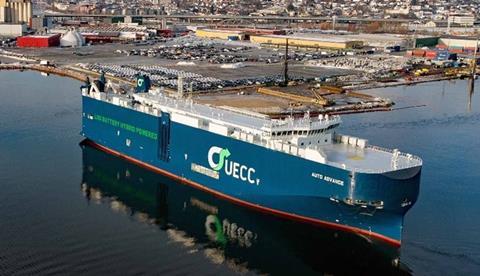United European Car Carriers (UECC) has signed an order for up to four multi-fuel battery hybrid pure car and truck carriers (PCTCs) to expand its fleet of more sustainable vessels.
The finished vehicle forwarder has placed the newbuild order with China Merchants Jinling Shipyard Nanjing. It covers two firm vessel orders scheduled for delivery in 2028, with options for two more vessels. That would bring UECC’s fleet of more eco-friendly vessels to nine. They will be deployed on UECC’s European short sea shipping liner network for the transport of finished vehicles, high and heavy equipment, and other rolling cargo.

UECC said the new vessels will have multi-fuel LNG-driven engines with the latest propulsion technology to optimise energy efficiency and an aerodynamic hull design to minimise fuel consumption. The vessels will also have the ability to draw power from sources at shore when at berth and have solar panels installed on the top deck.
According to the Norwegian company the PCTCs will also have a cargo capacity of 4,500 CEU across ten decks, two of which are hoistable. The 190-metre vessels will also have a quarter stern ramp capacity of 160 tons.
“Future-proofing of newbuilds is a cornerstone of our sustainability strategy,” said UECC’s CEO Glenn Edvardsen. “These PCTCs are therefore designed with advanced technologies to enhance fuel efficiency and reduce emissions, while being adaptable to accommodate future innovations and regulatory changes.”
Regulations and reductions
There remains a shortage of capacity for maritime finished vehicle shipments and vessel operators are investing to bring that back while at the same time looking to meet strict regulations on emissions in European waters. Part of the reason for tight capacity in ocean services is the redeployment of vessels for increased vehicle shipments from Asia to Europe, which has taken a lot of capacity away from the European short-sea business. At last week’s annual conference of the Association of European Vehicle Logistics (ECG), Costantino Baldissara, director of commercial logistics and operations at Grimaldi Group, and former ECG president, said the global fleet of ocean-going car carriers was down to around 750 vessels and available vessels moving vehicles between China and Europe are making four rotations a year because of longer transit times, up to 90 days, which was cutting capacity.
In terms of regulatory changes, since January 2024, the EU’s Emissions Trading System (EU ETS) has been extended to cover CO2 emissions from all vessels of 5,000 gross tonnage and above entering EU ports. From January 1, 2025, shipping companies will have to pay for 40% of their emissions reported in 2024. In 2026 that will rise to 70% of emissions reported in 2025 and from 2027, shipping companies will have to pay for 100% of their emissions.
UECC said its existing multi-fuel LNG battery hybrid vessels, Auto Advance, Auto Achieve and Auto Aspire, currently exceed the International Maritime Organization’s target for a minimum 40% reduction in carbon intensity by 2030. The fleet is also already running a compliance surplus in relation to FuelEU Maritime set for implementation next year.
UECC reports achieving a 25% reduction in CO2 emissions through the use of LNG on these and another two dual-fuel LNG vessels, Auto Eco and Auto Energy. The recent adoption of liquefied biomethane on its LNG-fuelled vessels has further reduced the carbon footprint of these vessels, while UECC is on track to increase the use of biofuels to 50% of its fleet this year.
Edvardsen said the latest newbuild investments demonstrate UECC’s intent to remain at the forefront of industry decarbonization as the company pushes towards its goal of eliminating the use of fossil fuels entirely by 2040.
“There is still a long way to go to reach net zero,” said Edvardsen. “These newbuilds will further strengthen one of the most environment-friendly fleets in the industry and enable us to realise our sustainability ambitions.”

























![Global[1]](https://d3n5uof8vony13.cloudfront.net/Pictures/web/a/d/s/global1_726550.svgz)













No comments yet